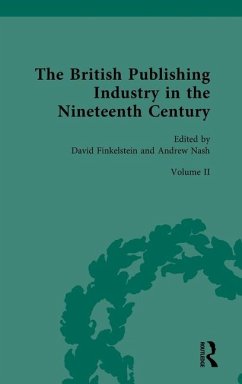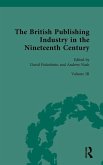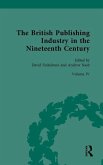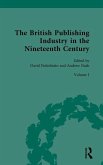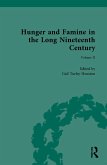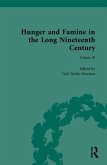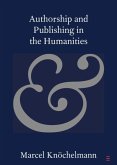The British Publishing Industry in the Nineteenth Century
Volume II: Publishing and Technologies of Production
Herausgegeben:Finkelstein, David; Nash, Andrew
The British Publishing Industry in the Nineteenth Century
Volume II: Publishing and Technologies of Production
Herausgegeben:Finkelstein, David; Nash, Andrew
- Gebundenes Buch
- Merkliste
- Auf die Merkliste
- Bewerten Bewerten
- Teilen
- Produkt teilen
- Produkterinnerung
- Produkterinnerung
This volume brings together key documents covering technologies of production that affected the British publishing industry during a significant period of change. It focuses in particular on key source material related to industrialisation of print production, which saw major leaps forward as mechanised innovations increased the speed, efficiency and delivery of texts through the production process. The introduction of iron, steam and other forms of rotary power presses improved the output of the print room over the century. Alongside this came improvements in typesetting and associated tasks,…mehr
Andere Kunden interessierten sich auch für
![The British Publishing Industry in the Nineteenth Century The British Publishing Industry in the Nineteenth Century]() The British Publishing Industry in the Nineteenth Century132,99 €
The British Publishing Industry in the Nineteenth Century132,99 €![The British Publishing Industry in the Nineteenth Century The British Publishing Industry in the Nineteenth Century]() The British Publishing Industry in the Nineteenth Century132,99 €
The British Publishing Industry in the Nineteenth Century132,99 €![The British Publishing Industry in the Nineteenth Century The British Publishing Industry in the Nineteenth Century]() The British Publishing Industry in the Nineteenth Century132,99 €
The British Publishing Industry in the Nineteenth Century132,99 €![Hunger and Famine in the Long Nineteenth Century Hunger and Famine in the Long Nineteenth Century]() Hunger and Famine in the Long Nineteenth Century137,99 €
Hunger and Famine in the Long Nineteenth Century137,99 €![Hunger and Famine in the Long Nineteenth Century Hunger and Famine in the Long Nineteenth Century]() Hunger and Famine in the Long Nineteenth Century137,99 €
Hunger and Famine in the Long Nineteenth Century137,99 €![Authorship and Publishing in the Humanities Authorship and Publishing in the Humanities]() Marcel Knochelmann (Connecticut Yale University)Authorship and Publishing in the Humanities20,99 €
Marcel Knochelmann (Connecticut Yale University)Authorship and Publishing in the Humanities20,99 €![The Routledge Handbook to Nineteenth-Century British Periodicals and Newspapers The Routledge Handbook to Nineteenth-Century British Periodicals and Newspapers]() Andrew KingThe Routledge Handbook to Nineteenth-Century British Periodicals and Newspapers61,99 €
Andrew KingThe Routledge Handbook to Nineteenth-Century British Periodicals and Newspapers61,99 €-
-
-
This volume brings together key documents covering technologies of production that affected the British publishing industry during a significant period of change. It focuses in particular on key source material related to industrialisation of print production, which saw major leaps forward as mechanised innovations increased the speed, efficiency and delivery of texts through the production process. The introduction of iron, steam and other forms of rotary power presses improved the output of the print room over the century. Alongside this came improvements in typesetting and associated tasks, with the adoption of linotype and monotype casting machines. Changes in available methods of reproducing illustrations such as the development of lithographic printing processes and, in the second half of the century, photographic processes such as half-tone and photogravure, enabled wider incorporation of illustrations into periodicals and books. Such technological changes also fed organisational changes within the print and publishing trade. National unions for the print trade were established in the middle of the century to adapt to new working conditions, and engaged in robust debates about technology and its effect in the workplace.
Produktdetails
- Produktdetails
- Verlag: Routledge / Taylor & Francis
- Seitenzahl: 430
- Erscheinungstermin: 14. März 2024
- Englisch
- Abmessung: 234mm x 156mm x 25mm
- Gewicht: 684g
- ISBN-13: 9780367568405
- ISBN-10: 0367568403
- Artikelnr.: 69937974
- Herstellerkennzeichnung
- Libri GmbH
- Europaallee 1
- 36244 Bad Hersfeld
- gpsr@libri.de
- Verlag: Routledge / Taylor & Francis
- Seitenzahl: 430
- Erscheinungstermin: 14. März 2024
- Englisch
- Abmessung: 234mm x 156mm x 25mm
- Gewicht: 684g
- ISBN-13: 9780367568405
- ISBN-10: 0367568403
- Artikelnr.: 69937974
- Herstellerkennzeichnung
- Libri GmbH
- Europaallee 1
- 36244 Bad Hersfeld
- gpsr@libri.de
Professor David Finkelstein (BA, PhD, FEA, FRHistS, FRSA) is a cultural historian who has published over 90 books, essays and refereed journal articles in areas related to nineteenth-century cultural history, print culture and media history, several of which have won awards. His most recent work includes Movable Types: Roving Creative Printers of the Victorian World (Oxford University Press, 2018), and the 850 page edited Edinburgh History of the British and Irish Press, volume 2: Expansion and Evolution, 1800-1900 (Edinburgh University Press, 2020). Current projects include a co-edited volume on the colonial periodical press, as well as work on print workplaces in Edwardian visual culture. Dr Andrew Nash (MA, MSc, PhD) is Reader in Book History and Deputy Director of the Institute of English Studies in the University of London's School of Advanced Study where he directs the MA in the History of the Book and the London Rare Books School. In addition to monographs on Victorian literature and Scottish literature, he has edited or co-edited many works in the field of book and publishing history including The Culture of Collected Editions (2003), Literary Cultures and the Material Book (2007), New Directions in the History of the Novel (2014) and, most recently, The Cambridge History of the Book in Britain, vol. 7: the Twentieth Century and Beyond (2019). He is part of a new Leverhulme-funded research project on the early history of the Society of Authors (2020-24).
Volume 2: Publishing and Technologies of Production
Volume 2 Introduction
Bibliography
Part 1. TECHNOLOGIES AND PROCESSES
Index
Volume 2 Introduction
Bibliography
Part 1. TECHNOLOGIES AND PROCESSES
- J. Y. W. MacAlister, 'The Durability of Modern Papers', The Library, 1, 10, 1 (1898), pp. 295-304.
- 'A Commercial History of a Penny Magazine' (1833) [4-part series] The Penny Magazine, vol 2: 'No. 1--Introduction & Paper-Making" 96 (August 31-September 30, 1833), pp. 377-84; 'No. 2. Wood-cutting and Type-founding', 101 (September 30-October 31, 1833), pp. 417-24; 'No. 3. Compositors' Work and Stereotyping', 107 (October 31-November 30, 1833), pp. 465-72; 'No. 4. Printing Presses and Machinery-Bookbinding', 112 (November 30-December 31, 1833), pp. 505-11.
- 'Mechanism of Chambers's Journal', Chambers's Edinburgh Journal, 3, 175 (6 June 1835), pp. 149-51.
- William Andrew Chatto, 'Wood-Engraving, its History and Practice', Illustrated London News (April 20, 1844), pp. 251-4; Supplement, pp. 257-9; April 27, 1844, pp. 273-4; May 4, 1844, pp. 293-4; May 11, 1844, pp. 309-310; May 18, 1844, pp. 325-6; June 1, 1844, pp. 357-8; June 22, 1844, pp.405-6; June 29, 1844, p. 417; July 6, 1844, p. 425.
- C. H. Timperley, 'Directions to Pressmen: of Presses', from The printers' manual containing instructions to learners with scales of impositions, and numerous calculations, recipes, and scales of prices in the principal towns of Great Britain together with practical directions for conducting every department of a printing office (London: H. Johnson, etc., 1838), pp. 89-94.
- John Jamieson, 'On Printing Machinery', Cowen Tracts, Proceedings of the Institution of Mechanical Engineers (1865), pp. 1-13.
- 'The Mechanism of the Wharfedale' British Printer, XV (Jan-Feb, 1902), p. 49.
- C. H. Timperley, 'Hand Typesetting', from, The printers' manual containing instructions to learners with scales of impositions, and numerous calculations, recipes, and scales of prices in the principal towns of Great Britain together with practical directions for conducting every department of a printing office (London: H. Johnson, etc., 1838), pp. 12-18.
- 'The Monotype', The Graphic (6 November 1897), p. 7.
- 'The Linotype Machine: What it Does and How it Works', Journal of the American Society for Naval Engineers (Feb 1900), pp. 208-211.
- 'Linotype Reading', British Printer 16 (1903), p. 232
- 'A Multiface Linotype Machine', Scientific American (8 August 1903), p. 97.
- 'Destruction of the Caxton Printing-office by Fire', Imperial Magazine, 3 (1821), pp. 243-52.
- 'Inside a Printing Office I', The Leisure Hour: A Family Journal of Instruction and Recreation (London) 12, 576 (3 January 1863), 13-15.
- 'Inside a Printing Office II', The Leisure Hour: A Family Journal of Instruction and Recreation (London) 12, 576 (10 January 1863), 28-31.
- 'The Newspaper Printing Office', The Leisure Hour: A Family Journal of Instruction and Recreation (London) 12, 579 (31 January 1863), pp. 76-8.
- 'A Modern Printing Works', [Manchester Guardian] British Printer, XV (November-December 1902), pp. 277-82.
- 'A Description of the Offices of the Strand Magazine', The Strand Magazine, 4 (December 1892), pp. 594-606.
- 'The "Daily Graphic" - How it is Done (From the Supplement to the "Graphic" Christmas Number.)' British Printer, V (1892), Jan-Feb, p. 8.
- John Southward, 'Progress in Book Printing', from Progress in Printing and the Graphic Arts during the Victorian Era (London: Simpkin, Marshall, Hamilton, Kent & Co Ltd, 1897), pp. 18-22.
- 'The Printer's Apprentice', The Penny Magazine (11 August 1838), pp. 306-8.
- Francis Bond Head, 'The Printer's Devil', The Quarterly Review, 65, 129 (December 1838), pp 1-30.
- 'A Few Words to Our Readers', Chambers' Edinburgh Journal, New Series, vol. III, no. 53 (4 January 1845), pp. 1-3.
- H. Ashton, 'How to Succeed as a Printer', British Printer, VII (Jan-Feb 1895), pp. 17-19.
- 'Some Notes on Compositors', The Leisure Hour: A Family Journal of Instruction and Recreation (London) (17 January 1860), pp. 37-40.
- 'The Printers' Chapel', The Leisure Hour: A Family Journal of Instruction and Recreation (London) (24 January 1863), pp. 62-4.
- 'How Macaulay's History was Bound', The Leisure Hour: A Family Journal of Instruction and Recreation (London) (31 January 1856), pp. 72-4.
- 'The Printing and Binding of the Revised Bible', The Leisure Hour: A Family Journal of Instruction and Recreation (August 1885), pp. 543-6.
- Frederick Saunders, The author's printing and publishing assistant, comprising explanations of the process of printing preparation ... (London: Saunders & Otley, 1839), pp 1-60.
- The Author's Handbook: a complete guide to the art and system of publishing on commission (London: E Churton, Commission Publishers, 1844).
- C. Kegan Paul, 'The Production and Life of Books', Fortnightly Review (April 1883), pp. 485-99.
- Emily Hill, 'What Can Our Daughters Do for a Living?', Women's Penny Paper, 8.195 (23 September 1897), p. 198.
- L. Barbara Brady and Anne Black, 'Women Compositors and the Factory Acts', The Economic Journal, 9, 34 (June 1899), pp. 261-6.
- 'The Trades Described' and 'Women's Work and Organisation', from J. Ramsay Macdonald (ed.), Women in the Printing Trades: A Sociological Study (London, 1904), pp. 1-16, 24-43.
- Charles Manby Smith, extract from The Working-man's Way in the World: being the autobiography of a journeyman printer (London, 1853), pp. 283-97.
- Andrew Aird, Letter Press Printing in Glasgow During the Last 50 Years (Glasgow: Privately Printed, 1882), pp. 5-10.
Part 2. PREMISES
Part 3. WORKING PRACTICES
Index
Volume 2: Publishing and Technologies of Production
Volume 2 Introduction
Bibliography
Part 1. TECHNOLOGIES AND PROCESSES
Index
Volume 2 Introduction
Bibliography
Part 1. TECHNOLOGIES AND PROCESSES
- J. Y. W. MacAlister, 'The Durability of Modern Papers', The Library, 1, 10, 1 (1898), pp. 295-304.
- 'A Commercial History of a Penny Magazine' (1833) [4-part series] The Penny Magazine, vol 2: 'No. 1--Introduction & Paper-Making" 96 (August 31-September 30, 1833), pp. 377-84; 'No. 2. Wood-cutting and Type-founding', 101 (September 30-October 31, 1833), pp. 417-24; 'No. 3. Compositors' Work and Stereotyping', 107 (October 31-November 30, 1833), pp. 465-72; 'No. 4. Printing Presses and Machinery-Bookbinding', 112 (November 30-December 31, 1833), pp. 505-11.
- 'Mechanism of Chambers's Journal', Chambers's Edinburgh Journal, 3, 175 (6 June 1835), pp. 149-51.
- William Andrew Chatto, 'Wood-Engraving, its History and Practice', Illustrated London News (April 20, 1844), pp. 251-4; Supplement, pp. 257-9; April 27, 1844, pp. 273-4; May 4, 1844, pp. 293-4; May 11, 1844, pp. 309-310; May 18, 1844, pp. 325-6; June 1, 1844, pp. 357-8; June 22, 1844, pp.405-6; June 29, 1844, p. 417; July 6, 1844, p. 425.
- C. H. Timperley, 'Directions to Pressmen: of Presses', from The printers' manual containing instructions to learners with scales of impositions, and numerous calculations, recipes, and scales of prices in the principal towns of Great Britain together with practical directions for conducting every department of a printing office (London: H. Johnson, etc., 1838), pp. 89-94.
- John Jamieson, 'On Printing Machinery', Cowen Tracts, Proceedings of the Institution of Mechanical Engineers (1865), pp. 1-13.
- 'The Mechanism of the Wharfedale' British Printer, XV (Jan-Feb, 1902), p. 49.
- C. H. Timperley, 'Hand Typesetting', from, The printers' manual containing instructions to learners with scales of impositions, and numerous calculations, recipes, and scales of prices in the principal towns of Great Britain together with practical directions for conducting every department of a printing office (London: H. Johnson, etc., 1838), pp. 12-18.
- 'The Monotype', The Graphic (6 November 1897), p. 7.
- 'The Linotype Machine: What it Does and How it Works', Journal of the American Society for Naval Engineers (Feb 1900), pp. 208-211.
- 'Linotype Reading', British Printer 16 (1903), p. 232
- 'A Multiface Linotype Machine', Scientific American (8 August 1903), p. 97.
- 'Destruction of the Caxton Printing-office by Fire', Imperial Magazine, 3 (1821), pp. 243-52.
- 'Inside a Printing Office I', The Leisure Hour: A Family Journal of Instruction and Recreation (London) 12, 576 (3 January 1863), 13-15.
- 'Inside a Printing Office II', The Leisure Hour: A Family Journal of Instruction and Recreation (London) 12, 576 (10 January 1863), 28-31.
- 'The Newspaper Printing Office', The Leisure Hour: A Family Journal of Instruction and Recreation (London) 12, 579 (31 January 1863), pp. 76-8.
- 'A Modern Printing Works', [Manchester Guardian] British Printer, XV (November-December 1902), pp. 277-82.
- 'A Description of the Offices of the Strand Magazine', The Strand Magazine, 4 (December 1892), pp. 594-606.
- 'The "Daily Graphic" - How it is Done (From the Supplement to the "Graphic" Christmas Number.)' British Printer, V (1892), Jan-Feb, p. 8.
- John Southward, 'Progress in Book Printing', from Progress in Printing and the Graphic Arts during the Victorian Era (London: Simpkin, Marshall, Hamilton, Kent & Co Ltd, 1897), pp. 18-22.
- 'The Printer's Apprentice', The Penny Magazine (11 August 1838), pp. 306-8.
- Francis Bond Head, 'The Printer's Devil', The Quarterly Review, 65, 129 (December 1838), pp 1-30.
- 'A Few Words to Our Readers', Chambers' Edinburgh Journal, New Series, vol. III, no. 53 (4 January 1845), pp. 1-3.
- H. Ashton, 'How to Succeed as a Printer', British Printer, VII (Jan-Feb 1895), pp. 17-19.
- 'Some Notes on Compositors', The Leisure Hour: A Family Journal of Instruction and Recreation (London) (17 January 1860), pp. 37-40.
- 'The Printers' Chapel', The Leisure Hour: A Family Journal of Instruction and Recreation (London) (24 January 1863), pp. 62-4.
- 'How Macaulay's History was Bound', The Leisure Hour: A Family Journal of Instruction and Recreation (London) (31 January 1856), pp. 72-4.
- 'The Printing and Binding of the Revised Bible', The Leisure Hour: A Family Journal of Instruction and Recreation (August 1885), pp. 543-6.
- Frederick Saunders, The author's printing and publishing assistant, comprising explanations of the process of printing preparation ... (London: Saunders & Otley, 1839), pp 1-60.
- The Author's Handbook: a complete guide to the art and system of publishing on commission (London: E Churton, Commission Publishers, 1844).
- C. Kegan Paul, 'The Production and Life of Books', Fortnightly Review (April 1883), pp. 485-99.
- Emily Hill, 'What Can Our Daughters Do for a Living?', Women's Penny Paper, 8.195 (23 September 1897), p. 198.
- L. Barbara Brady and Anne Black, 'Women Compositors and the Factory Acts', The Economic Journal, 9, 34 (June 1899), pp. 261-6.
- 'The Trades Described' and 'Women's Work and Organisation', from J. Ramsay Macdonald (ed.), Women in the Printing Trades: A Sociological Study (London, 1904), pp. 1-16, 24-43.
- Charles Manby Smith, extract from The Working-man's Way in the World: being the autobiography of a journeyman printer (London, 1853), pp. 283-97.
- Andrew Aird, Letter Press Printing in Glasgow During the Last 50 Years (Glasgow: Privately Printed, 1882), pp. 5-10.
Part 2. PREMISES
Part 3. WORKING PRACTICES
Index

